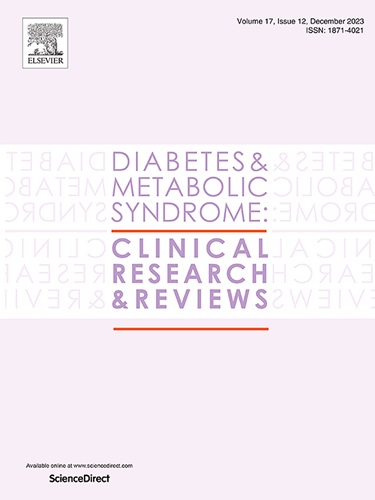Placenta-derived biomaterials vs. standard care in chronic diabetic foot ulcer healing: A systematic review and meta-analysis
IF 3.4
Q1 ENDOCRINOLOGY & METABOLISM
Diabetes & Metabolic Syndrome-Clinical Research & Reviews
Pub Date : 2025-01-01
DOI:10.1016/j.dsx.2024.103170
引用次数: 0
Abstract
Introduction
This study explored the effectiveness of current placenta-derived biomaterials therapies in ulcer healing in DFU compared to standard of care (SOC).
Methods
The systematic review and meta-analysis were performed following the Preferred Reporting Items for Systematic Reviews and Meta-Analyses (PRISMA) standard. The electronic databases of PubMed, EMBASE, and Web of Science (WoS) internet were searched for the outcome rate of complete ulcer healing. The risk of bias assessment was conducted using the tool recommended by the Cochrane Collaboration. Statistical analysis included the individual and combined result of the studies, heterogeneity test, the effect size, sensitivity analysis, and publication bias tests.
Results
Twelve randomized controlled trials (RCTs) with a total of 833 patients were included in this study. This meta-analysis showed a higher rate of complete ulcer healing in groups receiving placenta-derived biomaterials therapies (OR = 6.247 [4.425, 8.819], p < 0.01, I2 = 41 %) compared to control groups.
Conclusion
Placenta-derived biomaterials therapies have been shown to be more effective for achieving complete ulcer healing compared to current conventional treatments in DFU.
Implications for clinical practice
The utilization of placenta-derived biomaterials in therapies for wound healing, particularly in chronic DFU, presents promising implications for clinical practice. These biomaterials offer a rich source of growth factors, cytokines, and extracellular matrix components, which can stimulate tissue regeneration and angiogenesis. Incorporating such therapies into clinical practice holds the potential to accelerate wound closure, reduce infection rates, and improve overall healing outcomes in people with diabetic chronic foot ulcers. Furthermore, the availability of these biomaterials can offer clinicians a readily-accessible and cost-effective alternative to traditional wound care approaches, ultimately enhancing patient care and quality of life.
This research did not receive any specific grant from funding agencies in the public, commercial, or not-for-profit sectors.
胎盘来源的生物材料与标准治疗在慢性糖尿病足溃疡愈合:系统回顾和荟萃分析。
前言:本研究探讨了目前胎盘源性生物材料治疗DFU溃疡愈合的有效性,并与标准治疗(SOC)进行了比较。方法:按照系统评价和荟萃分析首选报告项目(PRISMA)标准进行系统评价和荟萃分析。检索PubMed、EMBASE和Web of Science (WoS) internet的电子数据库,查询溃疡完全愈合率。偏倚风险评估采用Cochrane Collaboration推荐的工具进行。统计分析包括各研究的单项和综合结果、异质性检验、效应大小、敏感性分析和发表偏倚检验。结果:本研究纳入12项随机对照试验(RCTs),共纳入833例患者。该荟萃分析显示,与对照组相比,接受胎盘源性生物材料治疗的组溃疡完全愈合率更高(OR = 6.247 [4.425, 8.819], p 2 = 41%)。结论:与目前的DFU常规治疗相比,胎盘源性生物材料治疗在溃疡完全愈合方面更有效。对临床实践的启示:利用胎盘来源的生物材料治疗伤口愈合,特别是慢性DFU,对临床实践有很好的意义。这些生物材料提供了丰富的生长因子、细胞因子和细胞外基质成分,可以刺激组织再生和血管生成。将这些疗法纳入临床实践有可能加速伤口愈合,降低感染率,并改善糖尿病慢性足溃疡患者的整体愈合结果。此外,这些生物材料的可用性可以为临床医生提供传统伤口护理方法的易于获取和成本效益的替代方案,最终提高患者的护理和生活质量。这项研究没有从公共、商业或非营利部门的资助机构获得任何具体的资助。
本文章由计算机程序翻译,如有差异,请以英文原文为准。
求助全文
约1分钟内获得全文
求助全文
来源期刊

Diabetes & Metabolic Syndrome-Clinical Research & Reviews
ENDOCRINOLOGY & METABOLISM-
CiteScore
22.90
自引率
2.00%
发文量
248
审稿时长
51 days
期刊介绍:
Diabetes and Metabolic Syndrome: Clinical Research and Reviews is the official journal of DiabetesIndia. It aims to provide a global platform for healthcare professionals, diabetes educators, and other stakeholders to submit their research on diabetes care.
Types of Publications:
Diabetes and Metabolic Syndrome: Clinical Research and Reviews publishes peer-reviewed original articles, reviews, short communications, case reports, letters to the Editor, and expert comments. Reviews and mini-reviews are particularly welcomed for areas within endocrinology undergoing rapid changes.
 求助内容:
求助内容: 应助结果提醒方式:
应助结果提醒方式:


